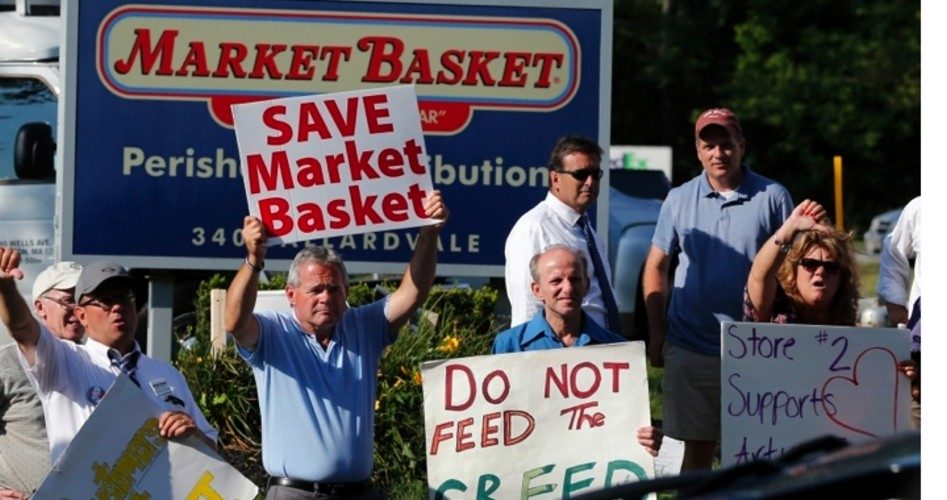
In a carefully-worded letter sent to its 25,000 employees on Tuesday, Market Basket’s new co-CEOs Felicia Thornton and James Gooch requested that the workers who have so far been successfully striking the 71-store New England grocery chain cave in and return to work. They should know the workers’ decision by next Monday.
Said the letter:
We are writing, one final time, to invite you to return to work and perform your job obligations. If your role requires that you primarily work at the company’s headquarters or distribution facilities, you must return to such role ready to fulfill your duties no later than Friday, August 15, 2014.
Alternatively, if your job is based in the field, you are required to return to work and contact either of us prior to August 15 to review the work you are performing. Should you choose to ignore either of these directives, the company will consider you to have abandoned your job, thereby ending your employment with the company.
The boycott began July 18, instigated by upper management and store managers, to protest the firing of company president and CEO Arthur T. Demoulas — called “Artie T” by his employees — by his cousin and opponent on the company’s board, Arthur S. Demoulas. The boycott has essentially shut down operations at most of the company’s stores throughout New England, with sales off between 80 and 90 percent in less than a month. This is costing the company an estimated $10 million every day.
This is the letter that Paul Gauthier, the manager of a Market Basket in Westford, Massachusetts, was afraid he was going to get. Under company rules his store is expected to generate $162 in revenue for every hour of work he gives to an employee. But despite revenues dropping so precipitously he has refused to cut the hours for his full-time people. Because of the boycott’s success, he said, “I’ve been given an impossible task. I’m waiting for [top management] to say: ‘You’re not doing your job. See ya.’” He got that letter on Tuesday.
Gauthier, like so many of Market Basket’s employees, supports the boycott, including other store managers who have asked customers not to shop at their stores until “Artie T” is back in charge.
Under Arthur T.’s management the chain has been adding five new stores to its New England footprint every year. It pays employees wages well above Massachusetts’ newly-mandated minimum wage, pays bonuses often equal to several months’ income, plus it provides a pension plan to which it contributes another 15 percent of workers’ income. All of this while keeping its costs down and its prices competitive with local competition, including Walmart. For all of that, Arthur T. has developed a cult-like following among his workers, one of whom, Anne Browne, an IT worker at the chain, said upon receipt of the letter: “Artie’s not in the office. If he’s not, I’m not.”
The chain, nearly a hundred years old, generates more than $4 billion in revenue annually and competes successfully in its markets against rivals which include Walmart, Hannaford’s, Shaw’s, and Whole Foods Market as well as other smaller stores.
The boycott has caused consternation among union officials who are watching developments closely. Most union-inspired boycotts are instigated to protest wage and salary cuts and reductions in pension and healthcare benefits. But Market Basket is non-union and the boycott has but one focus: to reinstate the beloved “Artie T.” If Market Basket’s employees are successful, who needs unions?
Ousted by the board last summer, Arthur T. has offered to buy out his estranged cousin for 50.5 percent of the company and restore order and profitability. For reasons unknown, his cousin has refused to accept his offer and has countered with offers unacceptable to Arthur T. Last Friday evening, for example, the board invited him back to stabilize the company and help provide a “path forward” but without reinstalling him as CEO. Arthur T. responded calling it “disingenuous” and turned it down.
As internecine squabbles continue, the chain continues to shrink. If not resolved soon, there will be little left to squabble about as customers and workers are shopping and finding work elsewhere. The board is about to learn one of the hard lessons about free markets: Customers reign supreme. Without customers, nothing else matters. For the board that lesson starts on Monday.
Photo of people protesting the firing of “Artie T” outside a Market Basket in Andover, Mass.: AP Images
A graduate of Cornell University and a former investment advisor, Bob is a regular contributor to The New American magazine and blogs frequently at www.LightFromTheRight.com, primarily on economics and politics.



